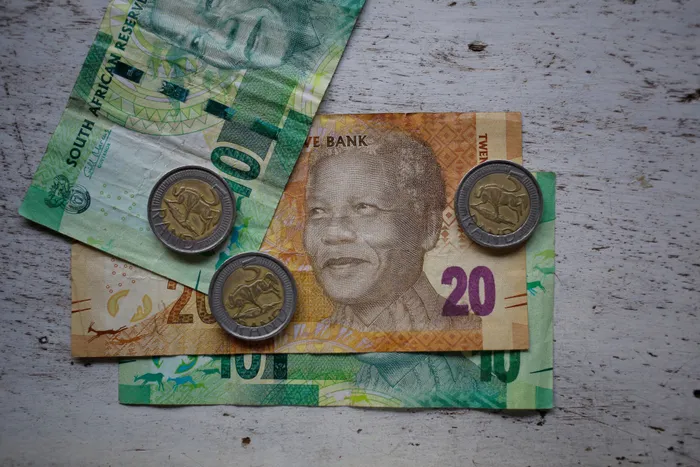Credit rating agency predicts stable SA outlook

South African rand notes and coins are pictured. Picture: EPA/KIM LUDBROOK
Johannesburg -There’s a new kid on the block in the highly regulated world of rating agencies dominated by the big three who control 95% of the market; it is the first from the African continent and it has boldly given South Africa, a country now inured to junk status ratings, a positive stable outlook for the short term.
Sovereign Africa Ratings (SAR) was launched at the Courtyard Hotel in Waterfall City on Friday afternoon and announced its arrival on the scene with a BBB long-term and B+ short-term with a stable outlook report for the country, albeit unsolicited.
Given that the usual suspects - Standard & Poor, Moody’s and Fitch Ratings were established in 1860, 1909 and 1913, respectively, SAR, just recently accredited, are relative greenhorns.
But they are aware of the challenges ahead and the responsibility their emergence has placed on them if what the speakers at the launch said is anything to go by.
SAR chief executive officer (CEO) Dr Sifiso Falala said: “We have had ratings agencies that have been rating us since 1994 and they have become part and parcel of the fabric of South African society. But their role has become more significant as calibrators of the quality of not just the economy but governance and the performance and efficiency of government. And to the extent that they now play a much bigger role in the markets, they affect the interests of Joe Soap, it has become critically important to have an African agency that can analyse information much more effectively," he said.
Falala added that they did not believe that their methods are exhaustive, and doesn’t think they will make that claim too. He said they think there’s room for an alternative view in the market which can best reflect how Africa is.
“Africa comes from a history of colonialism, and for that reason, it has government and players dealing with many issues, including socio-economic issues; governments that have to pay grants, spend more money on education, and all these things that have a long-term impact on our economy are overlooked in the manner in which these ratings are done, and there is much more subjectivity involved. We can show that subjectivity plays a role in the way in which our ratings are done, so our aim is to bring objectivity (into play),” he said.
Falala added that issues like a country’s natural resources should be taken into account when compiling a ratings report, but these are also ignored by the Big Three. He said factors such as GDP and economic growth “all those are overlooked or do not play as big a role in the ratings”.
According to Dr Falala, one got a sense that the ratings agencies sought to merely assimilate Africa into a Western model of their making.
“Their measurement instruments are not effective for African use, nor anywhere in the world,” Falala said, pointing out that the European Union (EU) set out to investigate how ratings agencies functioned: “The same as we’ve been calling for here.”
That space is crying out to be filled, there are gaps that an organisation like SAR can plug.
We’re not a political organisation, we’re an economic ratings agency, Falala said. “We have a responsibility to provide an accurate rating.”
Guest speaker Professor Steven Friedman, who described the advent of SAR as “an immensely positive development” said that he’d dealt with these rating agencies before and was wise to their ways, many of which were underhanded.
Of the birthing of SAR, Professor Friedman said we should “see it as an important African asset”.
“One of the falsehoods we saw was that the ratings bring here pure science, it is not. It is based on your experience. They rely on a small group (of local economists) to tell them what’s going on.”
SAR are a different story altogether, said Friedman: “They are far more likely to present an accurate rating than people who are not based here.”
SAR Board Chair Portia Divhani Ravhuhali said they were here to disrupt the status quo. In her words, “to expunge the myth that Africans cannot provide proper accurate ratings”.
She invoked former US president Barack Obama who said “Yes, we can.”
“What we’re launching is going to have an impact on the architecture of our financial systems.”
How different will SAR be from the Big Three? “We are of this country, of this continent. We have to conduct our business in such a way that we produce quality professional reports. Our credibility is our only real currency.”
Related Topics: